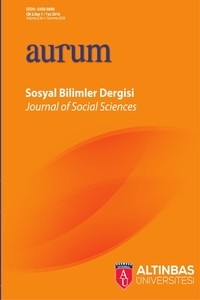Forced Population Movements as a Current Ethical Dilemma and the Possibilities of Collective Action
Sığınmacı krizi günümüzde zamanın ruhunu belirleyen, uluslararası toplumu zorlayan en önemli ekonomik, siyasal, çevresel ve demografik olgu olarak karşımıza çıkmaktadır. Krizin tarihsel çok boyutlu bir okuması bize ‘Arap Baharı’ sonrası ortaya çıkan, özellikle Suriye kökenli nüfus hareketinin aslında münferit ve öngörülemeyen talihsiz bir tesadüf olmadığını göstermektedir. Bu sebeple sığınmacı krizini çözmek için kısıtlayıcı olmayan geniş kapsamlı bir yaklaşımın sınır ötesi ve uluslararası seviyede üretilmesi ve çözüme yönelik bir yasal çerçevenin ivedilikle tartışmaya açılması gerekmektedir. Bu çalışma, günümüzdeki sığınmacı krizine tarihsel bir bakış açısı ile bakmayı ve uluslararası hukukun sığınmacı rejiminin gelişimini anlatmayı amaçlamaktadır. Bunu yaparken de çağdaş uluslararası toplumun konu ile ilgili olarak kolektif eyleme geçme kapasitesini incelemeyi hedefemektedir. Sığınmacı tarihi, devletlerin, karşılaştıkları krizler temelinde olumludan olumsuza, olumsuzdan eylemsizliğe sürekli tavır değiştirmeleri nedeniyle, sorun çözücü, kesintisiz ve lineer bir çizgide ilerlememiştir. Süreç içerisinde uluslararası örgütler ve sivil toplum kuruluşlarının katılımıyla büyüyen küresel yönetişime rağmen, devletler hala sığınmacı rejiminin temel belirleyici aktörleridir. Bu nedenle, devletin dahil olduğu her normatif bağlamda olduğu gibi, sığınmacı krizi bağlamında da etik ikilemler ortaya çıkmaktadır. Bu nedenle, bu çalışma son olarak süregiden sığınmacı krizinin yarattığı en güncel etik ikilem olarak Avrupa Birliği-Türkiye arasındaki sığınmacı anlaşmasına değinecektir.
Forced Population Movements as a Current Ethical Dilemma and the Possibilities of Collective Action
The spirit of our times has been increasingly determined by refugee crisis and asylum institutions. If one could read the ongoing economic, political, environmental and demographic crises correctly, a refugee crisis would not have been treated as unexpected, unfortunate singular coincidence. A comprehensive, non-proscriptive approach with a collective, multilevel engagement must urgently be generated by the international community to create an all-encompassing legal consciousness. This paper seeks to delve into the question of the current refugee crisis from an historical point of view and recount the progress of the international refugee regime. In doing that it will also discuss the possi- bility of the launch of a collective action by the international community in the present. Refugee history is not progressive; it has not linearly proceeded towards comprehensive solutions. There are ruptures, retreats, changes of attitude -from positive to negative, from negative to inaction. Despite the growing global governance with the participation of international and non-governmental organizations, states are still the major actors in the refugee regime. The dominant role of the states in managing the refugee crisis creates an ethical dilemma, as is the case in every normative context state is involved. This paper, therefore, will finally assess the ethical dilemma unveiled by the recent EU-Turkey refugee deal.
___
- Axelrod, Robert. The Evolution of Cooperation. New York: Basic Books, 1984.
- Bauman, Zygmunt. 44 Letters from the Liquid Modern World. Cambridge: Polity Press, 2010.
- Berkowitz, Roger. ‘Introduction: Thinking in Dark Times.’ In Thinking in Dark Times: Hannah Arendt on Et- hics and Politics edited by Roger Berkowitz, Jeffrey Katz, Thomas Keenan, 3-14. New York: Fordham Uni- versity Press, 2010.
- Dullien, Sebastian. ‘Paying the Price: The Cost of Europe’s Refugee Crisis,’ European Council on Foreign Re- lations Policy Brief, 28 April 2016, http://www.ecfr.eu/publications/summary/paying_the_price_the_cost_ of_europes_refugee_crisis
- ‘EU-Turkey Statement,’ International Summit European Council Press Release144/16, 18 March 2016.
- Ferris, Elizabeth and Kemal Kirişçi. ‘Not Likely to Go Home: Syrian Refugees and the Challenges to Turkey and the International Community,’ Brookings Institute, September 2015, http://www.brookings.edu/rese- arch/papers/2015/09/syrian-refugees-international-challenges-ferris-kirisci.
- Gürses, Ercan. ‘Turkey Spent 7.6 Billion Hosting 2.2 Million Syrian Refugees,’ Reuters, 18 September 2015, http://uk.mobile.reuters.com/article/idUKKCN0RI0N520150918?irpc=93.
- Hegel, G.W.F. (trn. By J. B. Baillie). The Phenomenology of Mind. Mineola, New York: Dover Publications, [first publication by the Macmillan Company: 1910]
- Hieronymi, Otto. ‘The Nansen Passport: A Tool of Freedom of Movement and of Protection,’ Refugee Sur- vey Quarterly, 22 (2003): 36-47.
- ‘Turkey ‘Illegally Returning Syrian Refugees.’ Ibid., 2. Kingsley, Patrick. ‘EU-Turkey Refugee Deal: Staff Shortages and Rights Concerns Pose Twin Threats,’ The Guardian, 1 April 2016, http://www.theguardian.com/world/2016/apr/01/refugee-deal-threatened-by- lack-of-staff-and-concern-at-turkish-human-rights.
- Leonard, Mark. ‘The Migration Superpowers’, Project Syndicate, 20 April 2016, https://www.project-syndicate. org/commentary/immigration-refugees-geopolitical-boon-by-mark-leonard-2016-04.
- Loescher, Gil. ‘Refugees and the Asylum Dilemma in the West.’ In Refugees and the Asylum Dilemma in the West edited by Gil Loescher, 1-7. Pennsylvania: The Pennsylvania State University Press, 1992.
- Loescher, Gil. The UNHCR and World Politics: A Perilous Path. Oxford: Oxford University Press, 2001.
- Maley, William. ‘Refugee Diplomacy.’ In The Oxford Handbook of Modern Diplomacy edited by Andrew F. Cooper, Andrew F., Jorge Heine, Ramesh Thakur, 675-690. Oxford: Oxford University Press, 2015.
- ‘Migrant Crisis: Migration to Europe Explained in Seven Charts,’ BBC, 4 March 2016 http://www.bbc.com/ news/world-europe-34131911.
- Olson, Marcur. The Logic of Collective Action: Public Goods and Theory of Groups. Cambridge, MA: Harvard University Press, 1965.
- Orchard, Phil. A Right to Flee: Refugees, States, and the Construction of International Cooperation. Camb- ridge: Cambridge University Press, 2014.
- Skran, Claudena M. ‘The International Refugee Regime: The Historical and Contemporary Context of In- ternational Responses to Asylum Problems.’ In Refugees and the Asylum Dilemma in the West edited by Gil Loescher, 8-37. Pennsylvania: The Pennsylvania State University Press, 1992.
- Tester, Keith. ‘Confusing World, Vulnerable People: On the Condition of Medialization.’ In Doubt, Time and Violence in Philosophical and Cultural Thought: Sino-Western Interpretations and Analysis edited by Arthur K. Wardega SJ Wardega, 1-18. Cambridge: Cambridge Scholars Publishing, 2012.
- ‘Turkey ‘Illegally Returning Syrian Refugees’-Amnesty’, BBC, 1 April 2016 http://www.bbc.com/news/world- europe-35941947.
- ISSN: 2458-9896
- Yayın Aralığı: Yılda 2 Sayı
- Başlangıç: 2016
- Yayıncı: Altınbaş Üniversitesi
Sayıdaki Diğer Makaleler
Forced Population Movements as a Current Ethical Dilemma and the Possibilities of Collective Action
Geleceğin Zemin Tekstillerini Tasarlamak
İzlenim Yönetimi Taktiklerinin Sosyal Kaytarma Üzerine Etkisi: Sağlık Sektöründe Bir Araştırma
Müge Leyla Yıldız, Emre İşçi, Suzan Taşçı
The Problematic of Savings: The Case of Turkey as an Emerging Market Economy
The Impact of Print Media on Popular Culture: Umberto Eco’s Number Zero
